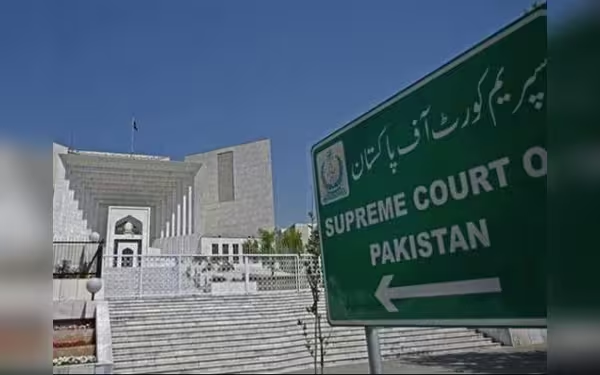Friday, October 4, 2024 04:25 AM
Imran Khan Challenges Supreme Court Bench Formation in Article 63-A Case
- Imran Khan's lawyer objects to new Supreme Court bench.
- Chief Justice emphasizes smooth proceedings amid tensions.
- Supreme Court's decision could impact party loyalty laws.
 Image Credits: urdupoint
Image Credits: urdupointImran Khan's lawyer raises objections in Supreme Court regarding Article 63-A, highlighting tensions in ongoing legal proceedings.
In a significant development within Pakistan's political landscape, the Supreme Court is currently reviewing petitions concerning defector members of the assembly under Article 63-A. This article is crucial as it addresses the disqualification of lawmakers who switch parties after elections. The case has garnered considerable attention, especially given the involvement of Imran Khan, the founder of Pakistan Tehreek-e-Insaf (PTI) and former Prime Minister.
During a recent hearing, Imran Khan's lawyer, Barrister Ali Zafar, raised an objection to the formation of a new bench by the Supreme Court. The Chief Justice of Pakistan, Qazi Faez Isa, responded by stating that the PTI would be heard later, indicating that the court proceedings would continue despite the objection. This exchange highlights the ongoing tensions and complexities surrounding the legal proceedings involving PTI and its leadership.
The five-member bench, which includes Justices Aminuddin Khan, Jamal Mandokhel, Naeem Akhtar Afghan, and Mazhar Alam Mian Khel, is tasked with addressing these critical review petitions. Notably, Justice Muneeb Akhtar opted not to participate in the bench, leading to the formation of a new panel with Justice Naeem Akhtar Afghan stepping in. This reshuffling of the bench has raised eyebrows and prompted objections from PTI's legal team.
Barrister Ali Zafar's concerns about the bench's reconstitution were met with a firm response from the Chief Justice, who urged him to wait for his turn to speak. The Chief Justice emphasized the importance of proceeding smoothly with the case, suggesting that the court is keen to maintain order amidst the ongoing legal challenges.
The Chief Justice also mentioned that he had proposed Justice Mansoor Ali Shah's name for the bench, indicating a desire for a comprehensive and fair hearing. He reassured the court attendees that the proceedings were transparent and that there was no hidden agenda at play. This statement aims to alleviate concerns about the integrity of the judicial process, especially in light of the current political climate.
As the Supreme Court continues to navigate these complex legal waters, the implications of its decisions will undoubtedly resonate throughout Pakistan's political arena. The outcome of this case could set significant precedents regarding party loyalty and the legal ramifications for lawmakers who choose to defect. For citizens and political observers alike, the unfolding events serve as a reminder of the intricate relationship between law and politics in Pakistan, underscoring the importance of judicial independence in a democratic society.













